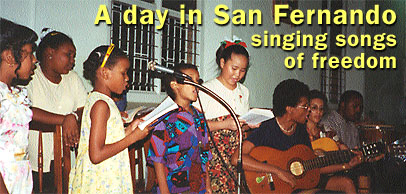|
|
The music of the Sunday evening children’s choir at St. Patrick
Catholic Church in Port-of-Spain is a mix of acoustic guitars
and bongo drums and the steel pan.
By Michael D. Wamble
STAFF WRITER
When Trinidadian author Michael Anthony penned the 1970 semi-autobiographical
novel “The Year in San Fernando,” a story that captures the journey
of a 12-year-old sent from the tiny village of Mayaro to live
in the city of San Fernando, he filled each page with the sights
and smells of Trinidad.
Still, of the five senses, the one this Eastern Caribbean state
indulges above all is that of sound.
The nation is flooded by sonic waves ranging from parang, a traditional
Christmas music to soca, the music of carnival, the annual pre-Lenten
celebration that precedes Ash Wednesday.
On the island, while religious communities differ in their opinions
of the often secularized festival found throughout the Caribbean,
South America and in New Orleans, it is a part of the nation’s
culture.
According to a local journalist, even priests will join with parishioners
celebrating carnival and the gift of life in the streets of Trinidad’s
capital city, Port-of-Spain.
Carnival can also serve as a unifying force in the country.
Faced with polarizing elections, as was the case during the winter,
economist and West Indian historian, Lloyd Best, stated that,
“We may fight and talk bad about each other before an election,
but when carnival comes, we’re all brothers and sisters again.”
Then there is calypso.
To the foreign ear, calypso is a mad blend of party rhythms that
rush down one’s legs to start toes to tap.
For Trintobagoans, it’s folk music with a Caribbean soul.
Even in the midst of questionable carnival acts, calypso can raise
matters of social justice—poverty, equal treatment under law,
freedom of religious worship—to the forefront of listeners’ minds.
The highlight of a 12-hour stay with a family in San Fernando,
the island’s second-largest city, was securing a ticket to The
Last Protest in Port-of-Spain, a calypso concert critical of Trinidad’s
ruling party.
Each artist that took the stage played a song from their music
catalogue to the delight of the mainly Afro-Trinidadian audience.
Between applause, the performer repeated the same melody, this
time with new lyrics describing the plight of the nation’s poor
and decrying the divisive nature of racial politics through metaphors.
Much like the black spirituals of Africans in America that used
religious imagery to send veiled messages of escape from bonds
of slavery, calypso tunes are songs of freedom coded in terms
tailored to a selected audience.
A similar form of music called chutney can be heard in the island’s
predominantly East Indian neighborhoods. Chutney artists have
a less critical view of island life.
Still, proud Trintobagoans in Port-of-Spain and San Fernando of
all ethnic heritages and political affiliations, manage to come
together for one last pre-Lenten “lime” (party).
Over a three-week period this winter season, Catholic New World
staff writer Michael D. Wamble participated in UCIP University
2000, an international program for journalists and members of
the Catholic press to study abroad.
Wamble spent each week in a different Caribbean country.
Next week, the second installment of a three-part series on faith
in the Eastern Caribbean continues in Guyana.
top
Front Page | Digest | Cardinal | Interview
Classifieds | About Us | Write Us | Subscribe | Advertise
Archive | Catholic Sites | New World Publications | Católico | Directory | Site Map
|
|






